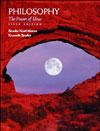| Al-Farabi | A ninth-century Islamic philosopher, posited the philosopher-prophet as the one providing the necessary illumination for his society.
|
 |
 |
 |
| Al-Ghazali | A late eleventh-century and early-twelfth-century Islamic philosopher, attacked Avicenna regarding the eternity of the world and the reduction of religious law to a mere symbol of higher truths.
|
 |
 |
 |
| Al-Kindi | A ninth-century Islamic thinker, used Greek ideas to define God as an absolute and transcendent being.
|
 |
 |
 |
| Averroës | A twelfth-century Islamic thinker, was thought of as holding two separate truths, that of religion and that of philosophy.
|
 |
 |
 |
| Avicenna (Abu Ali ibn-Sina) | A tenth-century Islamic thinker, felt that there is a parallelism between philosophy and theology.
|
 |
 |
 |
| Basho | The greatest Japanese haiku writer.
|
 |
 |
 |
| Buddhism | A philosophical tradition, founded by Gautama Siddhartha Buddha in the fifth century b.c., that took on various forms as a religion and spread throughout Asia; Buddhism attempts to help the individual conquer the suffering and mutability of human existence through the elimination of desire and ego and attainment of the state of nirvana.
|
 |
 |
 |
| Bushido | The way or ethic of the samurai warrior, based on service and demanding rigorous training, usually both in the military and literary arts.
|
 |
 |
 |
| Chuang Tzu | The most important Taoist after Lao Tzu and stressed the equality of opposites and the danger of usefulness.
|
 |
 |
 |
| Confucianism | A philosophical tradition that began with Confucius in the sixth century B.C. and continues to the present day; Confucianism is a practical philosophy that hopes to establish a better world order by means of the moral perfection of the individual.
|
 |
 |
 |
| Confucius | Founder of the most dominant system of Chinese thought, emphasized the perfectibility of people as well as their ability to affect things for the better.
|
 |
 |
 |
| Dogen Kigen | A Japanese Zen monk, stressed the importance of acquiring the perspective of the universal Self, given the impermanence of life.
|
 |
 |
 |
| Eightfold Path | The way or practice recommended in Buddhism that includes Right View, Right Aim, Right Speech, Right Action, Right Living, Right Effort, Right Mindfulness, and Right Contemplation.
|
 |
 |
 |
| Four Noble Truths | Buddha's answer to the central problem of life (1) There is suffering; (2) suffering has specific and identifiable causes; (3) suffering can be ended; (4) the way to end suffering is through enlightened living, as expressed in the Eightfold Path.
|
 |
 |
 |
| Hinduism | The Western word for the religious beliefs and practices of the majority of the people of India.
|
 |
 |
 |
| Hsün Tzu | A Confucian philosopher who set forth a blend of Confucianism and Taoism.
|
 |
 |
 |
| Hui Neng | Sixth patriarch of Chinese Zen, emphasized the oneness of all things.
|
 |
 |
 |
| Kabir | A late-fifteenth- and early-sixteenth-century Indian poet, was considered one of the great mystical poets in the tradition of Sufism.
|
 |
 |
 |
| Karma | The idea that your point of departure in life is determined by your decisions and deeds in earlier lives.
|
 |
 |
 |
| Lao Tzu | Founder of Taoism, held that the Tao is ineffable and beyond our ability to alter. He emphasized the importance of effortless nonstriving.
|
 |
 |
 |
| Mencius | A Confucian thinker second in importance to Confucius.
|
 |
 |
 |
| Miyamoto Musashi and Yamamoto Tsunetomo | Samurai writers who helped record and preserve samurai ideals of preparedness; indifference to pain, death, and material possessions, wisdom, and courage.
|
 |
 |
 |
| Murasaki Shikibu | An influential Japanese Mahayana Buddhist philosopher of the late tenth and early eleventh centuries, held that women were responsible moral agents who were capable of enlightenment and could influence their destines, reach nirvana, and achieve salvation.
|
 |
 |
 |
| Neoplatonism | A further development of Platonic philosophy under the influence of Aristotelian and Pythagorean philosophy and Christian mysticism; it flourished between the third and sixth centuries, stressing a mystical intuition of the highest One or God, a transcendent source of all being.
|
 |
 |
 |
| Nirvana | In Buddhism, the highest good; the extinction of will and of the accompanying ego, greed, anger, delusion, and clinging to existence. Achievement of nirvana means being freed from all future rebirths.
|
 |
 |
 |
| Sadr al-Din als Shirazi | A late sixteenth- and early-seventeenth-century thinker who was influenced by the mystical tendencies in Neo-Platonism, sought a return to the first principle of being.
|
 |
 |
 |
| Samurai | The warrior aristocracy of Japan.
|
 |
 |
 |
| Siddhartha Gautama Buddha | An Indian prince and founder of Buddhism, sought the causes of and cures for human suffering.
|
 |
 |
 |
| Sun Tzu | A sixth-century B.C. Taoist philosopher and general, applied Taoist philosophy to military strategy.
|
 |
 |
 |
| Tao | In Chinese philosophy, the Way the ultimate and eternal principle of unity, meaning, and harmony in the universe.
|
 |
 |
 |
| Taoism | One of the great philosophical traditions in China, according to which the individual will find peace and tranquility through quietly following the Tao.
|
 |
 |
 |
| Zen Buddhism | A form of Buddhism that reached its zenith in China and later developed in Japan, Korea, and the West; its name (Chinese Ch'an, Japanese Zen) derives from the Sanskrit dhyana (meditation). In early China, the central tenet of Zen Buddhism was meditation rather than adherence to a particular scripture.
|



 2002 McGraw-Hill Higher Education
2002 McGraw-Hill Higher Education